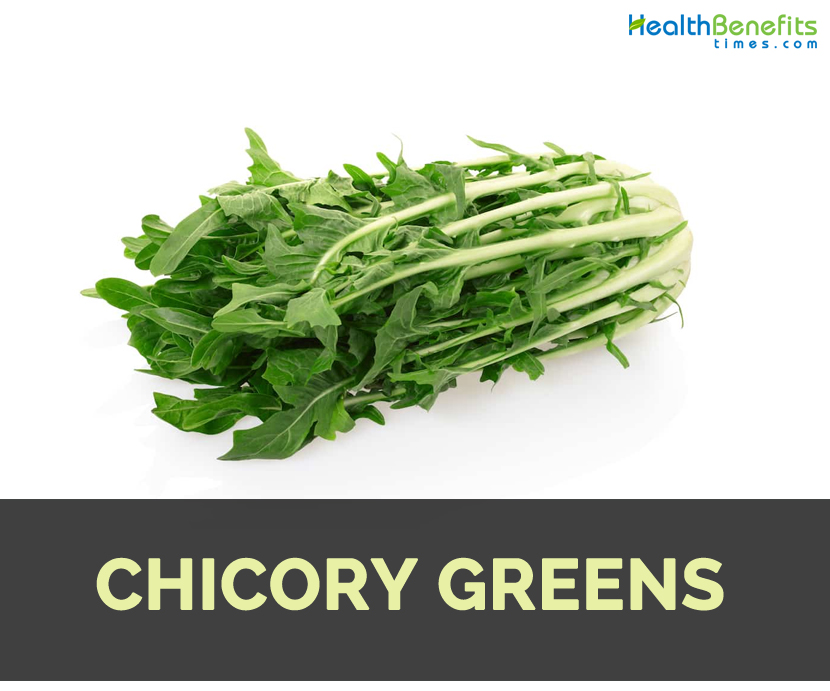Health Benefits of Chicory leaves
Chicory greens are a great source of niacin, thiamin and zinc. It is a great source of dietary fiber, Vitamin C, Vitamin A, Vitamin E, Vitamin B6, riboflavin, pantothenic acid, folate, iron, calcium, potassium, phosphorus, magnesium, manganese and copper. Though all leaves are edible but young ones are more preferred for consumption. Leaves resemble the dandelion plant. Leaves are loaded with flavor and some can be bitter. Raw chicory greens help to promote insulin sensitivity. Chicory leaves are a dietary choice for pre-diabetics and diabetics.
- Provide relieves constipation
Chicory is an excellent source of dietary fiber which prevents fat from foods consumed from being absorbed by intestines which indirectly assist weight loss. Dietary fibers add bulk to stools that encourages expulsion and provides relief from constipation. Fresh chicory offers 13% to 23% of dietary fiber. Insulin, a dietary fructans assist conditions such as diarrhea to non-insulin dependent diabetes.
- Probiotic activity
Chicory greens possess probiotic activity that helps to maintain digestive health. Chicory found in oligosaccharides upgrades fermentation in digestive tract that contributes to healthy gut flora. It also maintains digestive health by functioning optimally. Additionally, a same compound helps to inhibit formation of cancer in the colon.
- Antibacterial activity
Chicory leaves encompasses antibacterial properties effective to combat Micrococcus luteus, Staphylococcus aureus, Salmonella typhi bacteria and Escherichia coli.
- Anti-inflammatory activity
Apply the poultice prepared from crushed chicory leaves to skin to lower swelling. Plant preparations are used to promote bile production, promote appetite and used as contraceptive protection.
Culinary uses
- Leaves are added to salads.
- Young leaves are used as potherbs and cooked like spinach.
- Raw leaves are dressed with mayonnaise or vinaigrete.
- Add it to soups or serve as vegetable.
Selection and storage
- Select the greens having pale center surrounded by firm shiny crisp leaves which are curly and vivid green.
- Avoid tough, wilted and discolored yellow leaves.
- Store the chicory greens in a plastic bag or wrap it in a damp paper loosely.
Safety profile
- No side effects are known when used in moderate quantities.
- In pregnant women, it stimulate menstruation and possibly lead to a miscarriage.
- If you are pregnant there is a possibility that it can stimulate menstruation and possibly lead to a miscarriage.
- People allergic to marigolds, ragweed and daisies should avoid it.
- Too much intake of chicory could worsen gallstones so consult the doctor before adding it to diet.
References:
https://en.wikipedia.org/wiki/Chicory
https://www.drugs.com/npc/chicory.html
https://www.nutrition-and-you.com/chicory-greens.html
https://www.organicfacts.net/health-benefits/herbs-and-spices/health-benefits-of-chicory.html
http://www.goodwholefood.com/health-benefits-chicory/
https://www.nutrition-and-you.com/chicory-greens.html
https://www.natureword.com/tag/chicory-leaves-uses/
http://www.goodwholefood.com/health-benefits-chicory/
Comments
| Chicory greens Quick Facts | |
|---|---|
| Name: | Chicory greens |
| Origin | Europe, India, and Egypt |
| Colors | Green |
| Shapes | Stalked, lanceolate and unlobed |
| Taste | Bitter and spicy |
| Calories | 7 Kcal./cup |
| Major nutrients | Vitamin K (71.92%) Vitamin A (11.86%) Copper (9.56%) Vitamin B9 (8.00%) Vitamin C (7.78%) |
| Name | Chicory greens |
|---|---|
| Native | Europe, India, and Egypt |
| Common/English Name | Blue daisy, Blue sailors, Blue dandelion, Blue weed, Bunk, Coffeeweed, Cornflower, Hendibeh, Horseweed, Ragged sailors, Succory, Wild bachelor’s buttons, Wild endive, Witloof |
| Leaves shape | Stalked, lanceolate and unlobed |
| Taste | Bitter and spicy |
| Major Nutritions | Vitamin K (phylloquinone) 86.3 µg (71.92%) Vitamin A, RAE 83 µg (11.86%) Copper, Cu 0.086 mg (9.56%) Vitamin B9 (Folate) 32 µg (8.00%) Vitamin C (Ascorbic acid) 7 mg (7.78%) Vitamin B5 (Pantothenic acid) 0.336 mg (6.72%) Manganese, Mn 0.124 mg (5.39%) Vitamin E (alpha-tocopherol) 0.66 mg (4.40%) Iron, Fe 0.26 mg (3.25%) Total dietary Fiber 1.2 g (3.16%) |
| Calories in 1 cup, chopped (29 g) | 7 Kcal. |



